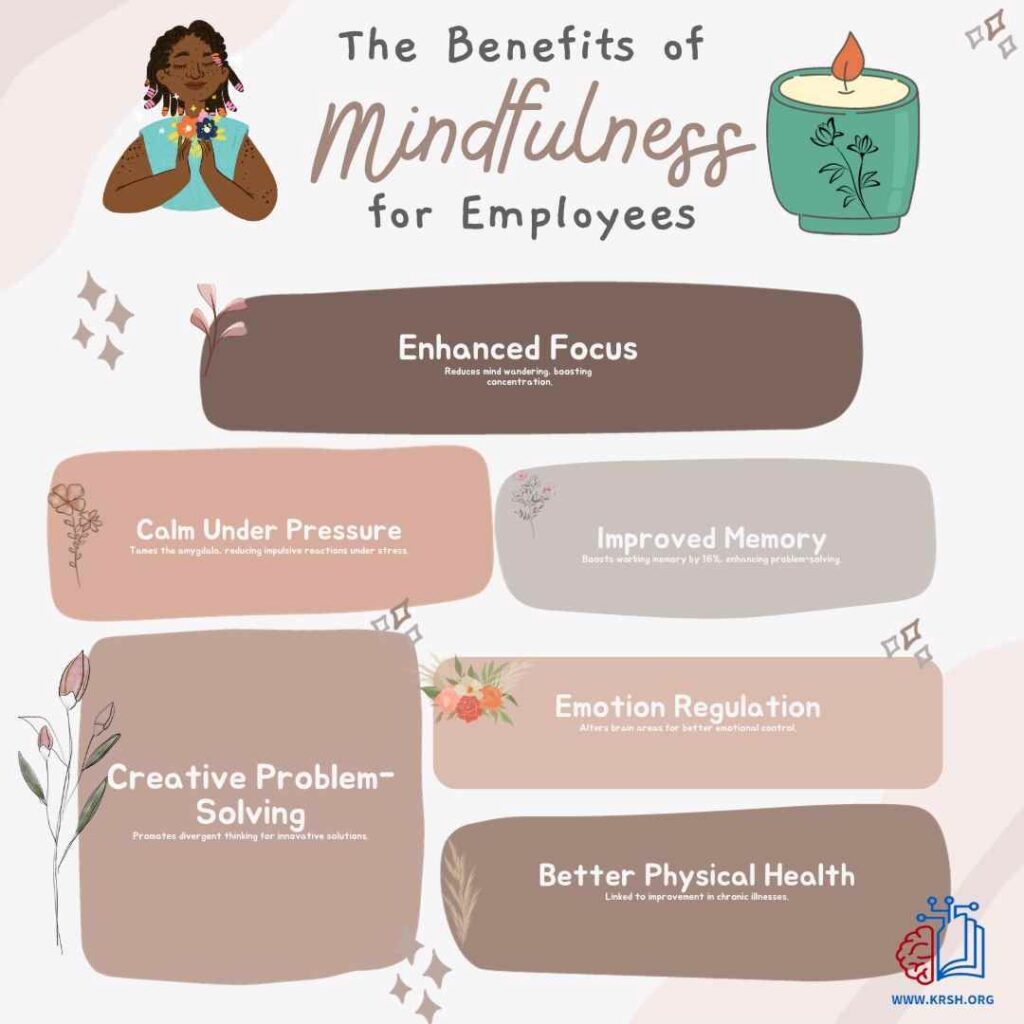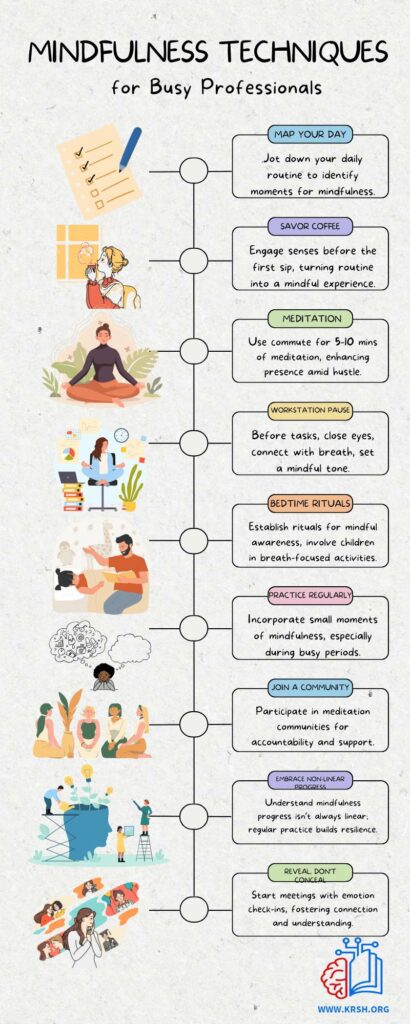For Indian employees, mindfulness fosters focus, stress reduction, and creative problem-solving. Executives gain composure, improving decision-making and conflict resolution. It cultivates corporate kindness and aids engineers in creative thinking.
Even the busiest of all – working parents – can integrate mindfulness with simple steps like mapping their day, practicing gratitude, or pausing for their feelings. Workstation pauses, reflective dinner moments, and bedtime rituals create a mindful work-life balance.
Mindfulness can be counterproductive in certain situations and job roles. It can even lead to negative emotions and poor job satisfaction.
Benefits of Mindfulness for Employees

1. Enhanced Focus: Regular mindfulness reduces mind wandering, boosting concentration even during multitasking. This means higher productivity and fewer missed opportunities. Executives swear by it, preventing daydreaming in crucial meetings.
2. Staying Calm Under Pressure: Mindfulness tames the amygdala, reducing impulsive reactions under stress. Imagine a high-level executive team benefiting from morning mindfulness, smoothing conflicts, and making strategic decisions calmly. It’s the secret weapon against workplace tensions.
3. Improved Memory: Mindfulness isn’t just for peace; it boosts working memory by 16%. In a professional setting, this means sharper thinking, better problem-solving, and smoother interactions. Less reactive amygdala equals a leader with a cool head and clear thoughts.
4. Good Corporate Citizenship: Mindfulness cultivates kindness, activating brain circuits for caring and generosity. The best corporate citizens practice it, becoming leaders people prefer. It’s not just about work; it’s about creating a positive impact.
5. Creative Problem-Solving for Engineers: Engineers need more than analysis skills—they need creativity. Mindfulness promotes divergent thinking, crucial for generating innovative ideas. “Beginner’s mind” and a kind attitude lead to novel solutions, protecting against self-criticism and fear of failure. It’s not just for peace; it’s a toolkit for engineers.
6. Improves emotion regulation: Mindfulness training directly alters areas of the brain that are activated and deactivated with regards to emotion-inducing stimuli. [6] This way it helps to regulate extreme emotions and even addictions.
7. Promotes better physical health: According to studies, mindfulness practices have been directly linked to improvement in type 2 diabetes, psoriasis, lower back pain, rheumatoid arthritis, and fibromyalgia and they also help people deal with chronic illness.
These benefits show that mindfulness isn’t just a buzzword; it’s a game-changer for Indian employees, enhancing focus, resilience, and creativity in the workplace.
Techniques for Practicing Mindfulness
Whom do you think is the most busiest person to practice mindfulness? If you see around, it is most likely a working parent. The parent needs to take care of hundreds of things for their kids right from their food to clothing to toys. Doing it along with a full job makes it feel overwhelming.
1. Mapping Your Day: Begin by jotting down your daily routine, acknowledging the various activities from waking up to bedtime. Recognize the typical moments where mindfulness can be seamlessly integrated. This foundational step creates awareness of potential opportunities for brief mindful pauses.
2. Savoring the Coffee Moment: Pause before that first sip of coffee. Engage your senses—smell the aroma, feel the warmth of the mug in your hand, and take three intentional breaths. Transform a routine task into a mindful experience, setting a positive tone for the day.
3. Train Ride Meditation: Utilize your daily commute for mindfulness. Once settled on the train, allocate five to ten minutes for meditation. Focus on your breath or use a mindfulness app for guided meditation. Whether eyes open or closed, this practice enhances presence amid the hustle.
4. Workstation Pause: Infuse mindfulness into work routines. Before diving into tasks, take a moment to close your eyes. Notice the sensation of your feet on the floor, feel your body in the chair, and connect with your breath. This brief pause sets the tone for a mindful approach to the workday.
5. Reflective Dinner Preparation: Amid preparing meals, take a moment to reflect on the food’s journey. Visualize the hands that planted, picked, or transported it to your table. Express gratitude during family dinners when everyone is present, fostering a shared mindful experience.
6. Bedtime Rituals for Mindful Awareness: Establish bedtime rituals that cultivate mindful awareness. For younger children, involve them in a breath-focused activity with a stuffed animal. Older kids can engage in a head-heart-gut check-in, assessing their mental state, emotions, and any unshared thoughts from the day.
7. Start Small, Practice Regularly: Recognize that mindfulness doesn’t require large time commitments. Research suggests positive brain changes can occur with just eight weeks of consistent practice. Instead of waiting for extensive free time, incorporate small moments of mindfulness, especially during busy and hectic periods.
8. Praying: Spending few minutes in prayer at morning and before sleep is one of the most powerful ways to practice mindfulness.
Integrating these simple mindfulness practices into your daily routine as a working parent can foster a sense of calm and presence, enhancing overall well-being amidst life’s demands.
We now list further techniques which can be infused into your routine. Transform mindfulness from a sporadic effort to a sustainable practice, enhancing focus, resilience, and overall well-being in the dynamic Indian corporate environment.

9. Join a Community: Many executives struggle to sustain a meditation practice alone. While apps offer accessibility, traditional communities, like Vipassana or Yoga centers, provide accountability and support. Shared intention and progress inspire a sense of quietude and spaciousness.
10. Commit to a Fixed Practice Time: Structure is vital for regular practice. Designate a non-negotiable time for meditation; say blocking 3:00 PM daily for a 20-minute session. Creating such routine fosters discipline and reinforces the importance of mental well-being in the workplace.
11. Work with an Instructor: Mastery often requires guidance. Engage with an experienced therapist. Their training, often spanning decades, ensures proper support, especially during challenging moments like physical discomfort or persistent thoughts.
12. Embrace Non-Linear Progress: Mindfulness progress isn’t always linear, and expectations can be misleading. Understand that not every session will leave you refreshed. Similar to physical workouts, mental soreness indicates strengthening. Regular practice, even when challenging, builds resilience and the ability to rest in open awareness.
13. Feel the Feeling – Without Judgment: Pause and identify your feelings throughout the day. Name them specifically and observe the sensations within your body. Allow the feeling to be present without attempting to change it. This mindful approach creates awareness and may lead to the dissipation of the feeling over time.
14. Drop the Story, Not the Feeling: Recognize that our interpretations generate feelings. Mindfulness helps disengage from self-reinforcing stories, giving back a sense of agency. Letting go of the story allows for curiosity and a willingness to address situations directly, propelling individuals into positive action.
15. Reveal, Don’t Conceal: Introduce mindfulness into meetings by starting with a check-in on emotions. Share feelings in a reflective state, avoiding blame. This openness fosters connection and intimacy. Revealing feelings, especially about significant changes like mergers, creates understanding and solidarity among team members.
These strategies empower employees to navigate their emotions mindfully, promoting a healthier workplace dynamic. By embracing mindfulness, individuals can cultivate resilience and positive responses to challenges, fostering a more supportive and collaborative work environment.
Negative Impact of Mindfulness Exercises
While mindfulness offers numerous benefits, its integration into the workplace requires careful consideration of potential limitations. Excessive awareness, especially of negative emotions, can be challenging. Organizations must recognize that a one-size-fits-all approach is inadequate, necessitating a proactive consideration of both the positive and negative impacts of mindfulness interventions tailored to specific job requirements.
Mindfulness can increase awareness of negative emotions, making certain work tasks less pleasant. For employees in roles involving surface acting, the heightened awareness of inauthenticity and negative emotions may reduce job satisfaction and performance.
Mindfulness and Accountability: Breath-based and loving-kindness meditation can reduce stress in emotionally charged social interactions but may hinder accountability. In roles demanding intense social interaction, mindfulness proves beneficial. However, for positions with less authentic social engagement, mindfulness might be counterproductive, particularly when emotions need to align with the job’s demands.
Challenges in Customer-Facing Roles: Mindfulness may pose challenges for employees in roles requiring surface acting, such as salespeople or customer service representatives. Becoming more mindful of emotions during inauthentic interactions may negatively impact mental health, job satisfaction, and overall performance. Crafting a balance is crucial, considering the demands of roles involving emotional labor.
Implementing Mindfulness Program at Workplace
To optimize the benefits of mindfulness while minimizing its costs, organizations should consider strategic questions before implementing interventions:
- Targeting: Tailor mindfulness programs to roles with lower demands for surface acting.
- Timing: Optimal timing for mindfulness interventions based on employees’ workflows can enhance effectiveness.
- Distraction: Offering healthy distractions, like fidget toys or puzzles, may help employees in roles requiring unpleasant surface acting.
- Deep Acting: Combining mindfulness programs with training in deep acting can be more effective for roles involving emotional labor.
Mindfulness is a personal experience, and individuals react differently to various practices. Experimenting and adapting mindfulness strategies that work best for each employee’s unique role, routine, and mindset is crucial. Whether through focused breathing, grounding techniques, visualization, or other meditative activities, employees and managers should explore what aligns with their preferences and yields the most effective results.
SFBT and Mindfulness
In the hustle of corporate life, Solution-Focused Brief Therapy (SFBT) can be a shortcut to apply mindfulness. Imagine a therapy that doesn’t dwell on problems but fast-tracks you to solutions. SFBT, shifts the focus to your strengths and positive outcomes. It’s like a mental gym session, which builds resilience and mindfulness. It can help you be stress-resistant and distraction-averse, navigating the chaos with ease. SFBT at Krsh Welfare Foundation isn’t just therapy; with personal care its a empowering journey to mindful, empowered life. Say goodbye to workplace chaos and hello to a calmer, more focused you! Ready to level up? Book your SFBT session now!
References
[1] https://www.collinsdictionary.com/dictionary/english/mindfulness
[2] https://web.colby.edu/cogblog/files/2014/05/Moore-Malinowski-2009-.pdf
[3] https://www.researchgate.net/publication/5908947_The_role_of_mindfulness_in_romantic_relationship_satisfaction
[4] https://www.frontiersin.org/articles/10.3389/fpsyg.2021.724126/full
[5] https://pubmed.ncbi.nlm.nih.gov/20141302/
[6] https://www.sciencedirect.com/science/article/abs/pii/S0149763414001481?via%3Dihub
[7] https://pubmed.ncbi.nlm.nih.gov/25425224/
[8] https://doi.org/10.2147/PRBM.S34937
[9] http://nrs.harvard.edu/urn-3:HUL.InstRepos:25757884
[10] https://www.sciencedirect.com/science/article/abs/pii/S0272735813000731?via=ihub
[11] Kabat-Zinn J (2013). Full Catastrophe Living: Using the Wisdom of Your Body and Mind to Face Stress, Pain, and Illness. New York: Bantam Dell.
[12] https://www.sciencedirect.com/science/article/abs/pii/S0165032710006087?via%3Dihub
[13] https://www.researchgate.net/publication/222830032_Mindfulness-Based_Relationship_Enhancement
[14] http://www.contextualpsychology.org/act
[15] Linehan M (1993). Cognitive-Behavioral Treatment of Borderline Personality Disorder. Guilford Press.
[16] https://doi.org/10.1037%2Fh0101009
https://chj.rums.ac.ir/article_104311.html?lang=en